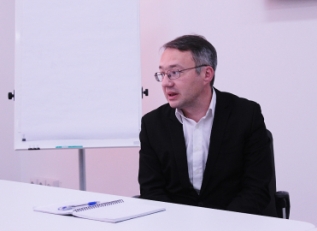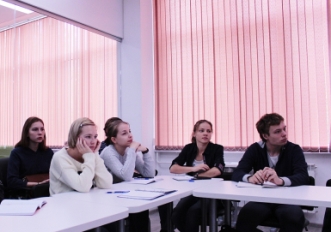Studying borders

LSAR master student Seil Djanyzakova shares her impressions of the classes:
The topic of the course - ‘Borders Research’ - seems to be one of the most relevant not only in today’s socio-anthropological studies but also in such fields as political science, international relations, economic geography, and other.
The course contained some very interesting material. In our first classes, Ivan Olegovich introduced the students to the main areas, theoretical approaches and methodological concepts used in borders research as well as to topical issues related to borders and border areas. We learned about leading international researchers and their work in this field.
Ivan Peshkov then presented his own field material to both bachelor and master students of anthropology. For a long time, he has studied Russian-Chinese border territories from the perspective of border theory. First and foremost, he places his research focus on the formation of contemporary borders of these two states and on the impact of those borders on the local population on both sides.
In these lectures, the researcher elaborated on this aspect of his research through the example of Manchuria that has long been in state of ‘transition’ between the Russians and the Chinese. Today, Manchuria is a Chinese area generating 70 % of trade between China and Russia.
The course covered the history of this border territory, the current state of local affairs that is affected by the border itself and by bilateral trade. It was this fieldwork and experience gained in borders research that proved most useful to the anthropology students for whom fieldwork is central.

Ivan Olegovich Peshkov is one of the anthropologists and lecturers whose arrival I was looking forward to. He had acted as an expert at the academic event ‘Migration and the ethnicization of cities’ held at the LSAR in the summer of 2015. At that time, he had offered us some valuable advice and gave constructive feedback on participants’ presentations. His view and understanding of what is going on in anthropology, especially in practical terms, allow me conclude that Ivan Olegovich is one of few researchers whose opinions I absolutely subscribe to. After that event I was hoping for an opportunity to attend his lectures. And so, we have been attending his course twice a week for two weeks now, and I find it very useful because being an anthropologist myself, I am interested in migrant communities. And he knows the region I study very well, thus we have found a common ground here as the factual information he refers to is very well known to me. I would also like to underline his approach to the classes: Ivan Olegovich draws attention to the necessity of dialogue, and so by the end of each lecture we are expected to reflect on what has been said in the classroom trying to apply newly received information to our own field or area of interest. The lecture material is filled with the lecturer’s hands-on field experience, which helps us better absorb and digest it.
Ivan Olegovich showed us a lot of field photographs of his. He also provided references for further reading on certain regions and research lines in the anthropology of borders that will make up a great basis for theoretical analysis of my field material as well.
It is noteworthy that apart from the knowledge and historiographical input related to borders research that we have been exposed to during these days, we have also discussed ethical issues and ways of dealing with them, and this is of great use to all of the students of anthropology as fieldwork is an indispensable part of our scientific activity.
‘Thank you’ to Ivan Olegovich for insightful conversations and reflections. It does not happen often that the students get to be listened to and indeed understood by the teacher. And ‘thank you’ to the LSAR for the opportunity to attend this course.





 The project "Man in a Changing World. Identity and Social Adaptation: Past and Present" is funded by the Russian Government
The project "Man in a Changing World. Identity and Social Adaptation: Past and Present" is funded by the Russian Government 